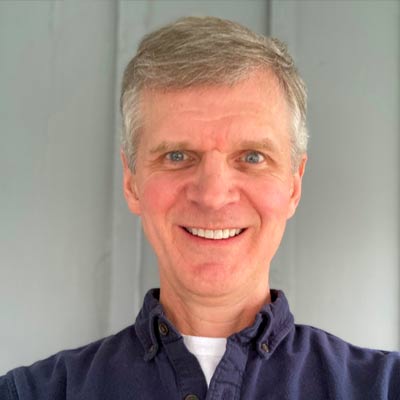Ed McDaniel worked as a psychologist for more than 30 years, where the focus of his career was on giving support to people with disabilities. He continues to support others in retirement, too.
"I made the decision that when I had worked for 30 years for the state of North Carolina, that I would retire. But in retirement I was going to continue to find ways to support people." As Ed explains, "Compassion is having empathy, and acting on it. And that’s what I’m doing in my retirement."
Ed was born with hearing loss. Then, at the age of 28, he was diagnosed with retinitis pigmentosa (RP), which leads to progressive vision loss.
"For me, I was born with hearing loss. So that hasn’t been so difficult. But when I started losing my vision … that had a much bigger impact on me. It had a greater impact on my mental health to face a progressive loss of my vision," Ed explains.
"I had the benefit of my training in psychology before losing my vision, but it was still difficult for me. I had good coping skills, and I knew I needed to give myself time to grieve the loss of my healthy vision. It was really only by going through that grieving process that I could then start to accept the situation and open myself up and begin looking for resources that may be available to help me."
For several years into his experience with progressive vision loss, Ed was actively searching for a cure for RP. He pinned his hope for the future to this cure. He remembers attending a research conference where days were filled with presentations about research and treatments. But evenings offered him the chance to meet other people with RP and Usher syndrome.
"That was really where I started to actually find some hope" Ed explains. "It wasn't in the research, but it was in the evenings where I met other people. They were all different ages and had different stages of vision loss. I was able to see that they were living very productive and full lives."
"30 years later and there's still no treatment for RP," Ed explains. "I'm glad there is research going on and I think there could at some point be some treatment. But if I had been focusing on a cure for the past 30 years, I wouldn't be where I am today, learning to live with my vision loss."
About a year ago, someone he met on social media invited Ed to join a low vision support group in Asheville, North Carolina. After attending that group for a while, he decided to start his own group where he lives, in a rural area in the foothills of North Carolina. With Hadley’s technical support hosting the group via zoom for those who want to join remotely, the group has met with a tremendous response.
Ed has been featured on Hadley’s podcast discussing the topic of grief and vision loss. He will also appear on a future episode on the topic of emotional triggers and vision loss, giving advice on how to cope with these common, emotionally-charged occurrences.
For all the support he has given to the community of people living with vision loss, Ed has been nominated as a Hadley Hero this quarter.
Thank you, Ed!
